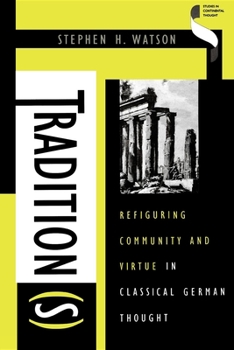Tradition(s)
Tradition(s)
Refiguring Community and Virtue in Classical German Thought
Examining the work of Foucault, Kant, Heidegger, Hobbes, and Hegel, Stephen H. Watson tackles the questions: What is the origin of the concept of tradition? How does the notion of tradition affect our understanding of the present and the past? What exactly is tradition?
Studies in Continental Thought--John Sallis, general editor
1998. 336 pages, 6 1/8...
Format:Paperback
Language:English
ISBN:B001RPXC5W
ISBN13:9780253211521
Release Date:January 1998
Publisher:Indiana University Press
Length:344 Pages
Weight:1.22 lbs.
Dimensions:1.0" x 6.1" x 9.2"
Grade Range:Postsecondary and higher
Related Subjects
PhilosophyCustomer Reviews
2 ratings
A highly original historical work in hermeneutic theory.
Published by Thriftbooks.com User , 24 years ago
An excellent work in serious continental philosophy, but not easy reading (Watson's prose is full of terminology from 20th century French and German critics). Watson develops a conception of tradition and critique as two sides of rationality and meaning in general. This general account is indebted to MacIntyre, Gadamer, and the hermeneutic tradition but is highly original. The rest of the work illustrates and develops this notion of rationality through historically rich studies of ethical themes --including conceptions of character, goodness, friendship, and duty-- in classical German idealists (who Watson sees as starting the `tradition' of his concept of traditionality). The main examples are Fichte, Schelling, Kant, and Hegel, but Watson also branches off into discussions of Husserl, Heidegger, T.S. Elliot, Marcel Proust. At the level of philosophy of language, the aim is to carve out a conception of meaning, reason, truth, and originality that allows for the historicity of concepts without completely rejecting the ideal regulative value of claims to universality. In other words, Watson hopes to find a position somewhere in between Derrida, Gadamer, and Husserl. An excellent work for those with some background in continental philosophy but not a good book for an introductory seminar in continental thought or 19th century German thought. This is an advanced work. See my full review essay in the Hegel Society Journal, *The Owl of Minerva,* 2000.
Guidance to readers:
Published by Thriftbooks.com User , 25 years ago
An excellent work in serious continental philosophy, but not easy reading (Watson's prose is full of terminology from 20th century French and German critics). Watson develops a conception of tradition and critique as two sides of rationality and meaning in general. This general account is indebted to MacIntyre, Gadamer, and the hermeneutic tradition but is highly original. The rest of the work illustrates and develops this notion of rationality through historically rich studies of ethical themes --including conceptions of character, goodness, friendship, and duty-- in classical German idealists (who Watson sees as starting the `tradition' of his concept of traditionality). The main examples are Fichte, Schelling, Kant, and Hegel, but Watson also branches off into discussions of Husserl, Heidegger, T.S. Elliot, Marcel Proust. At the level of philosophy of language, the aim is to carve out a conception of meaning, reason, truth, and originality that allows for the historicity of concepts without completely rejecting the ideal regulative value of claims to universality. In other words, Watson hopes to find a position somewhere in between Derrida, Gadamer, and Husserl. An excellent work for those with some background in continental philosophy but not a good book for an introductory seminar in continental thought or 19th century German thought. This is advanced stuff.






